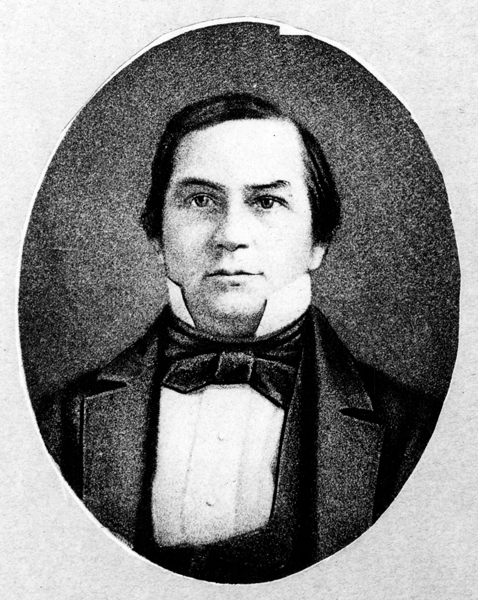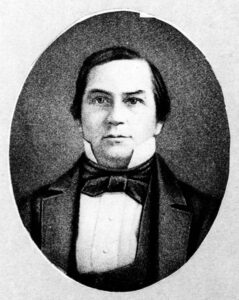Isaac Johnson
Beginning his term just after the passage of the Constitution of 1845, Governor Johnson was determined to uphold its somewhat controversial provisions including the elimination of property qualifications that limited the voting pool, and the creation of a public school system.

Courtesy of State Library of Louisiana
Governor of Louisiana Isaac Johnson in the 1840s. Unidentified
Democrat Isaac Johnson served as governor of Louisiana from 1846 until 1850. Beginning his term just after the passage of the Constitution of 1845, Johnson was determined to uphold its somewhat controversial provisions including the elimination of property qualifications that limited the voting pool, and the creation of a public school system. Though Johnson angered members of his own party by appointing Whigs to some political positions, few doubted where he stood on the issues. An outspoken supporter of state’s rights, he favored the expansion of slavery and the annexation of Texas.
Born on Troy Plantation in New Feliciana, Spanish West Florida (now West Feliciana Parish) on November 1, 1803, Isaac Johnson was the son of John Hunter Johnson and Thenia Munson Johnson, and the grandson of Isaac Johnson, an early British pioneer who played an important role in the West Florida Revolt. Little is known about his early life, but he was probably tutored privately before studying law with an uncle in St. Francisville. In 1828 his uncle made him a partner in law, and Johnson married Charlotte McDermott, with whom he had three children.
In 1833 Johnson was elected to the Louisiana House of Representatives, where he served on the Judiciary Committee. In New Feliciana, he also served on various committees including one to counteract the actions of abolitionists and another to protect the parish from robbers and vagrants. In 1839, Johnson was appointed judge of the Third Judicial District. Shortly thereafter, Governor Alexandre Mouton appointed him secretary of state, but Johnson quickly resigned to avoid the threat of yellow fever in New Orleans, then the state capital.
After being nominated for governor at the Democratic Party convention, Johnson defeated Whig candidate William DeBuys in 1846. In his inaugural address, Johnson indicated his support for the recently passed Constitution of 1845, which abolished the property qualification for voting and/or holding public office and directed the legislature to create a public school system. A strong proponent of public education, he appointed the first superintendent of education and, in 1848, called a special session of the legislature that resulted in an appropriation of $550,000 for the public school system. When a U.S. war with Mexico began, Johnson called out the state militia by proclamation on May 4, 1846, and sent several regiments to serve under General Zachary Taylor. In addition, he requested the creation of a new state insane asylum and signed a bill that moved the state capital from New Orleans to Baton Rouge.
Johnson’s term ended on January 28, 1850 and his successor, Joseph Marshall Walker, appointed him state attorney general. While running for a seat on the state supreme court in 1853, Johnson had a heart attack and died in a New Orleans hotel on March 15. He is buried on Troy Plantation in West Feliciana Parish.
Adapted from William H. Adams’s entry for the Dictionary of Louisiana Biography, a publication of the Louisiana Historical Association in cooperation with the Center for Louisiana Studies at the University of Louisiana, Lafayette.
Sources:Sidney Joseph Aucoin, “The Political Career o Isaac Johnson, Governor of Louisiana,” Louisiana Historical Quarterly, XXVIII (1945); Edwin Davis, The Story of Louisiana (1960).
